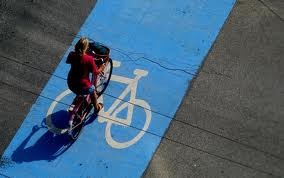
We all win when more people bike, more often
Opinion piece for DomPost, (printed with minor edits, 24 January 2012, pB5)
Riding a bike is fun. Most of us remember the sense of freedom when cruising round the neighbourhood as kids. It is a convenient way to get around. It eliminates parking worries. Our air and waterways are cleaner.
Biking makes you feel good.
So why do we waste time and money by bickering?
It's a familiar pattern.
Someone riding a bike gets knocked off, assaulted, or is seen running a red light.
A new battle in the undeclared cyclist vs motorist feud ignites. Angry letters are exchanged and flame wars break out on the internet. Gradually the heat dies down and everyone retreats to their corners until the next skirmish, but little has been achieved.
It's time we rose above pointless bickering.
Let's start with some facts.
First, riding a bike is an ordinary, everyday activity.
More than a million people in New Zealand ride bikes, according to the Ministry of Transport. Some are kids, some dress in lycra, some in frocks, some like to get muddy, and plenty are dressed in normal clothes as they go from home to work.
Second, biking is great for our economy.
On an individual level, riding a bike saves you petrol dollars - which can then be spent on locally-owned businesses. It frees up road space and car parks for drivers.
On a national level it lowers the cost of building and maintaining roads, and creates jobs. It reduces our dependency on expensive imported fuel, making our transport system more resilient to price shocks.
We will certainly fall behind the cities we compete with if we fail to invest in cycling - because they're already doing it.
For example, in 2010, Sydney commissioned independent research to quantify the economic benefits of the proposed Inner Sydney Regional Bike Network. The study by AECOM found the network would deliver at least $506 million - or $3.88 for every dollar spent - in economic benefits over 30 years, and reduce Sydney's traffic congestion by 4.3 million car trips a year.
The return on investment is so good that Sydney is spending $70 million on cycling for everyday transport.
Cycling brings in big bucks from tourism. Rotorua has quantified the value of cycle tourism. In the Whakarewarewa Forest, cycle tourism is worth $10.2 million, much more than the timber industry, at $4.6 million. Is there a town or city in New Zealand that doesn't want a $10 million dollar business?
New Zealand's cycle tourism market has the potential to double what tourists spend annually, from $320 million to $640 million, according to Ministry of Tourism research in 2009.
In other words, it costs us money - serious money - to not invest in cycling.
Third, biking is good for you. It lowers health costs.
Riding a bike halves your risk of heart disease, cancer, diabetes and depression. Like everything in life, there are risks, but these are far outweighed by the health benefits. Research published by the British Medical Association says health benefits outweigh risks by 20 to 1.
People who cycle regularly have the health of someone 10 years younger.
Fourth, riding a bike is much safer than many people believe.
Cycling crashes are newsworthy precisely because they are rare. An average of 11 people each year are killed while cycling - while thousands die prematurely because of inactive lifestyles and poor diets. Sitting on the couch with chippes and a sugary drink is much more likely to kill you. These deaths are seldom reported. Scaring people off cycling is a health and safety disaster.
Perhaps the best way to cut hospital waiting lists and beat the obesity epidemic is to invest in getting more people biking, more often.
No-one is saying bicycles will replace cars, buses and trucks. But with two thirds of urban trips shorter than 6 km, and a third shorter than 2 km, riding a bike is a realistic option for many of our daily journeys.
So where should we start?
The Cycling Advocates' Network proposes three simple steps.
Create connected cycleways in cities, and shoulders on key rural roads.
Introduce on-road cycle training in schools and for adults who want to cycle for transport.
Launch a new, fresh public education programme for safe road use.
How can we afford this? The good news is that investing in cycling is cheaper than not doing so. We avoid health and road-building costs, and lower our fuel and greenhouse gas bills. The savings are re-invested into creating local jobs.
Cycling is good for us and good for our economy.
We all win when more people ride bikes, more often.
Patrick Morgan is a project manager at the Cycling Advocates' Network. He was awarded a Winston Churchill Memorial Fellowship in 2011 to study cycle skills training.

Comments
Nice piece!!
As above!
With a bit of luck, other Fairfax newspapers will reprint
David H